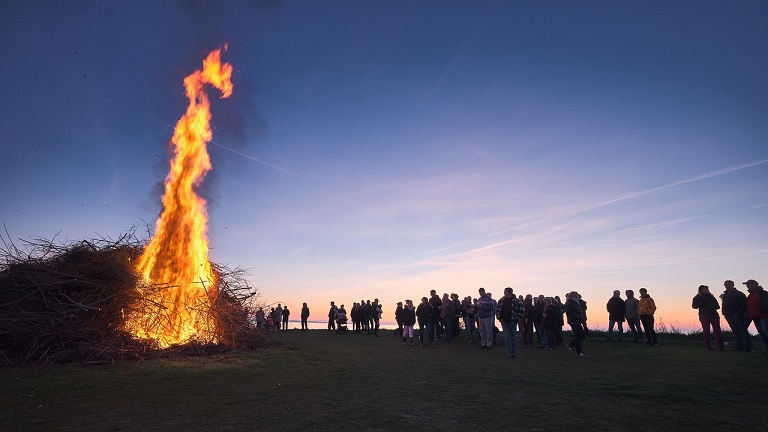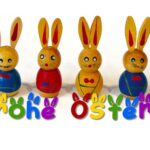
Easter in Germany isn’t just about painted eggs and chocolate bunnies—it’s also about fire. Every year, communities across Germany gather around towering Osterfeuer (Easter fires), lighting up the night to celebrate renewal and the triumph of light over darkness. These bonfires, often held on Easter Saturday or Easter Sunday, have been part of German culture for centuries, blending pagan, Christian, and regional traditions into one mesmerizing spectacle.
Although the custom varies by region, its underlying theme remains the same: a powerful symbol of cleansing, resurrection, and community togetherness. Some believe it drives away evil spirits, while others see it as a celebration of Christ’s resurrection. In modern times, these fires continue to be a social highlight of the Easter season, drawing families and friends together to welcome spring.
Let’s explore the origins of the Easter fire tradition, how it has evolved over time, and where you can experience one in Germany today.
The Origins of Osterfeuer: A Blend of Pagan and Christian Traditions
The practice of lighting fires in spring predates Christianity, stretching back to pre-Christian Germanic tribes who worshiped the sun and nature deities.
Pre-Christian Pagan Fire Rituals
Long before Easter fires were associated with Christianity, early Germanic people lit large bonfires to mark the changing seasons.
- Fertility and renewal: Fire was believed to drive away winter spirits and bring fertility to the land.
- Pagan sun worship: Many ancient tribes saw fire as a way to honor the sun gods, calling for warmth and prosperity in the coming year.
- Protection against evil: It was thought that flames could ward off dark forces and bring blessings to homes and livestock.
Read more: The History of Easter in Germany: Pagan Roots to Christian Traditions
The Christian Influence: Fire as a Symbol of Resurrection
As Christianity spread across Germany, pagan customs were merged with Christian celebrations.
- Light overcoming darkness: The fire became a symbol of Christ’s resurrection, representing victory over sin and death.
- The Easter Vigil connection: In many churches, Easter Saturday night begins with a sacred fire, from which the Paschal candle is lit.
- Blessing the community: Priests would bless the Osterfeuer, and its flames were seen as sacred and protective.
By the Middle Ages, Osterfeuer had become an official part of Easter festivities, balancing both religious and community significance.
How Osterfeuer is Celebrated in Germany Today
Easter fires remain a beloved part of German Easter celebrations, particularly in northern and rural regions.
Regional Variations
1. Northern Germany (Lower Saxony, Schleswig-Holstein, and Bremen)
- The biggest Easter fires are held in coastal regions, where huge wooden structures are built days in advance.
- Some fires are used to burn old Christmas trees, a symbolic act of moving from winter to spring.
- The events often feature food stalls, music, and festive gatherings.
2. Bavaria and Southern Germany
- While less common than in the north, some villages still maintain small Easter fire traditions.
- Fires in Bavaria are often linked to mountain celebrations, with spectacular bonfires on hillsides.
3. Eastern Germany (Saxony, Brandenburg, Thuringia)
- Here, the tradition merges with Slavic customs, emphasizing community blessings and family gatherings.
Read more: Easter in East vs. West Germany: How the Holiday Was Celebrated Differently During the Cold War
Modern-Day Celebrations
While the symbolic meaning of Osterfeuer remains strong, the way Germans celebrate has evolved.
- Many events now feature barbecues, beer tents, and live music.
- People bring bread and sausages to roast over the embers after the main fire dies down.
- Some towns organize parades and torch-lit processions leading to the fire site.
Despite modernization, the sense of community and tradition remains at the heart of Osterfeuer.
Where to Experience Easter Fires in Germany
If you want to see one of Germany’s famous Easter fires, here are some of the best places to visit:
1. Hamburg & Bremen
Northern Germany hosts some of the biggest Easter fires. Look for beachside fires along the Elbe River or the North Sea coast.
2. Hannover & Lower Saxony
Villages in Lower Saxony light massive Osterfeuer, often combined with traditional folk music and dancing.
3. Berlin & Brandenburg
Easter fires in Brandenburg are more intimate, often held in small towns with a strong community focus.
Read more: German Easter Markets: Where to Find the Best Easter Celebrations
How to Host Your Own Osterfeuer at Home
Want to bring a touch of German Easter magic to your backyard? Here’s how to create your own mini Osterfeuer at home.
- Choose a safe location → Always light your fire in an open space away from trees and buildings.
- Use natural wood → Traditional fires are built from dry logs, branches, and leftover Christmas trees.
- Invite friends & family → Osterfeuer is about togetherness, so make it a social event.
- Prepare Easter treats → Grill sausages, bread, and marshmallows over the embers.
- Add a symbolic touch → Write wishes or worries on paper and throw them into the fire as a ritual of renewal.
By following these steps, you can honor the Osterfeuer tradition in your own way.
Osterfeuer is more than just a bonfire—it’s a powerful tradition that links Germany’s past and present. From its pagan roots in fertility rites to its Christian association with resurrection, the Easter fire has remained a beacon of renewal and hope. Today, whether celebrated in small villages or major cities, Osterfeuer continues to bring communities together in warmth, light, and festive spirit.
Want to Learn More About German Easter?







